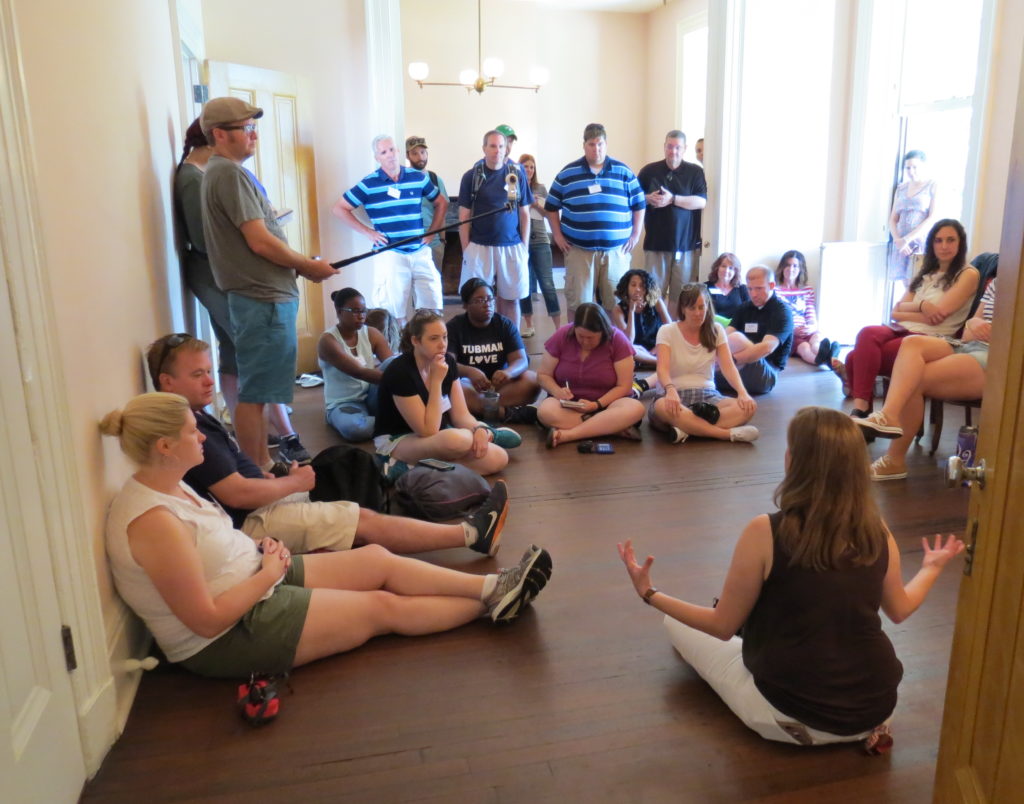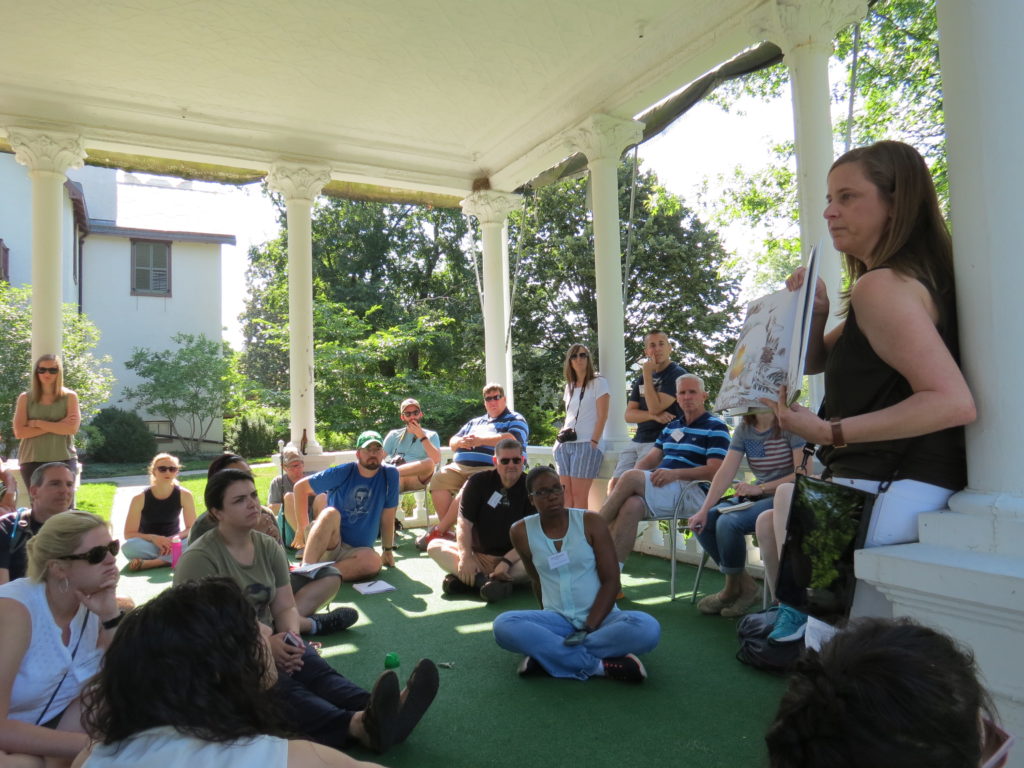
Associate Director for Programs Callie Hawkins (right) sits in the Drawing Room as she leads the Civil War Teacher Fellows on a tour of the Cottage.
This month President Lincoln’s Cottage helped host the Civil War Washington Teacher Fellows, an annual week-long educational fellowship for elementary, middle, and high school teachers from across the country. This past week, 24 teachers came to the nation’s capital to immerse themselves in the history of Civil War Washington. This fellowship is a partnership between President Lincoln’s Cottage, Ford’s Theatre Society, Frederick Douglass National Historic Site, and Tudor Place Historic House and Garden. The teachers spent the day at the Cottage learning about Lincoln’s Brave Ideas and how to translate those ideas into their classrooms.
We asked individual teachers to reflect on their experience; why they think it’s important to learn about Lincoln’s Brave Ideas, and how they’ll apply these ideas:
David, curriculum coordinator from Moore, Oklahoma:
“To be here at the Cottage, you really get a sense of Lincoln’s humanity. You get to learn that the President came out here for a place of solitude, to reflect, and to grieve over the loss of his son, and this place allowed these ideas to be nourished, to flourish, and to grow into the Emancipation Proclamation. I think it’s important to learn about Lincoln’s brave and big ideas, because we often deify many of our political leaders – especially those like Lincoln or Kennedy who have been assassinated – and we often emphasize their legacy.”
As the curriculum coordinator for my district, I’m going to return with some ideas to help teachers from all different grade levels try to incorporate some of these concepts in their classrooms. I think it’s a great idea to incorporate the Aesop fable about the sheep and the wolf. Those dueling interest of rights; you gave me my freedom because the sheep is no longer being attacked, but you’re taking my freedom because you’re taking my food source away. In Oklahoma, one of our teaching standards required for 1st and 2nd graders is teaching the concept of rights and responsibilities. So that’s a perfect way of introducing that idea to them.”
Stephanie, 4th grade teacher from Mobile, Alabama:
“Brave ideas are essential in our world, especially in our country today. Coming here and sitting on the veranda, where Lincoln sat and struggled with those ideas, you’re more able to see that was not easy for him.
I love teaching fourth graders because you can bring back the ideas as seeds and plant them, and students are so enthusiastic. I think I’ll start with What Do You Do With An Idea?, just to help them realize that their ideas are important and valuable. They’re our future, and we need those brave ideas. Not only do we want them to give us their brave ideas, we need them to.”
Nick, 4th-6th grade special education teacher from California:
“I think it’s important to understand for teaching, and for our future, that Lincoln’s ideas are about change. His ideas of unifying everyone – even with all of our differences – are the most important. All of the opinions we see in the news change every day. It’s important to remember that we’re all in this together as a country.”
Ryan, 8th grade American history teacher from Pittsburgh, Pennsylvania:
“I think it’s important to get in Lincoln’s mindset. We often think of him at the White House pondering these thoughts, but it’s really his time at the Cottage that he’s able to ponder and have time for deeper reflection. When you go to the second floor and in the room where he really drafted the emancipation proclamation… I think, the quiet nature of this venue allowed those powerful ideas to come forward.
Brave ideas take time to develop. And I want to use Lincoln as a story for them, not only to deeper their understanding of American history, but to help them understand that their own brave ideas are going to take time and reflection and peer editing. You know we talked about how Seward was helping Lincoln, and they were having this back and forth, and there were even some disagreements at times. But brave ideas take time to develop.”
Jen, 3rd grade teacher from Connecticut:
“First and foremost, I think it’s important to learn about these brave ideas because it’s what helped shape our country in one of the most pivotal times in the development of our union. I think now, more than ever, our country is equally as divisive, and a lot of the issues and ideas that Lincoln are relevant to what’s going on in our world today. The perspective of where he was thinking, and what he was trying to build, are things that we’re still doing in today’s world.
I teach 3rd grade, and it’s important to let them know what the seeds were that started the country that they live in. I teach in a very diverse community, and I think sometimes it’s not acknowledged how hard it was to get where we are, and I think that students, especially the young ones, they don’t understand the value of what ideas can do, and they don’t understand that they can make change. They can be agents of change, even as 7 or 8 year olds.”
Moneisha, 5th and 6th grade social studies teacher from New Orleans, Louisiana:
“I think it’s important to learn about brave ideas because when you think about Lincoln, he was constantly stepping outside of what was considered the ‘status quo.’ So, when it came to looking at the union, and what was going to be best for the entire union, his ideas may not have been agreed upon by everyone, but when he looked at them long term, and the impact, it was very brace of him to step outside of what was moral at the time.
When I think about my 5th and 6th graders, right now they’re at the point of their lives where everything about them is changing, and for them to step out of their bubble and do something that’s considered “different” is extremely scary. One of the things I push a lot in my classroom is this culture of error, that you won’t get everything right. But being able to raise your hand and give your opinion and your thoughts, and really join into the classroom conversation, and being OK with your mistakes, just proves that you’re trying. So I think I’ll take back his ideas and explain to students that if you’re constantly trying to do better, and you always want to use your voice to speak up if something you think shouldn’t be happening is happening.”
The second week of July, the partnering historic sites will host a different group of local teachers for the second session of the fellowship.

Callie Hawkins reading “What Do You Do With an Idea?” to the Civil War Washington Teacher Fellows
